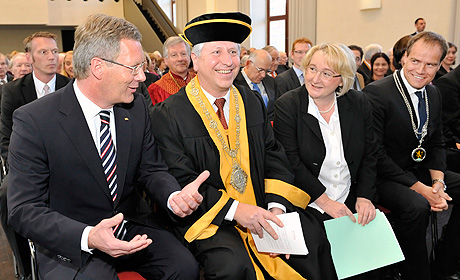Model Cooperation
24. October 2011
2011 Annual Celebration Closes 625th Anniversary Year of Ruperto Carola

Heidelberg University has made an essential contribution to shaping the excellent reputation Germany enjoys in the fields of science and research. Federal President Christian Wulff highlighted this fact in his address during the 2011 Annual Celebration. To study, teach, and research in Heidelberg is a privilege, one that also brings with it the responsibility to be a model university. “Universities guide their students, as well as our citizens and our country“, he continued in the Great Hall of the New University. The occasion marked the close of the year of festivities honouring the university’s 625th anniversary and simultaneously welcomed the start of the new academic year. Rector of Heidelberg University, Prof. Dr. Bernhard Eitel, greeted an audience of approximately 850.
Model cooperation
In his speech, the rector recalled the start of the anniversary year at the Annual Celebration in October 2010. “In the last several months we have witnessed academic events and scientific conferences of the highest calibre attended by persons of eminence, giving Heidelberg new prominence as an international centre of science”, said Prof. Eitel. He also praised the rich variety of events that were open to the broader public, and added: “With the successful modernisation of the New University and the publication of the Heidelberg “Wissenschaftsatlas” (Academic Atlas), Heidelberg University’s accomplishments were indeed impressive.” For the “model cooperation with and for each other” Prof. Eitel expressed his gratitude to the faculty and staff, students, scientists and scholars, friends, supporters and alumni of the university, as well as colleagues from the non-university research institutions.
Successful development
In his remarks, Prof. Eitel reflected on the successful growth of Heidelberg University since the start of the Excellence Initiative in 2006/2007 – thanks to an increase in third-party funding, growing numbers of employed scientists, and innumerable prizes and successes in competitions in the European Union. He also underscored the systematic expansion of individual disciplinary strengths and the interdisciplinary cooperation essential to addressing cross-cutting issues, the strengthening of the alliances and partnerships with non-university research institutions, and continued internationalisation. The university consistently strove to hasten the pace of turning outstanding results in basic research and competencies into something of value for society, he went on.
New strategic orientation of academic policy
Prof. Eitel tied this retrospect to the need for academic policy to adopt a new strategic orientation. This includes assuming greater direct responsibility for the “flagships of the German university landscape” and equipping it as befits a leading competitive international university. “If we want, as stated in the goals of the Excellence Initiative, to make and keep top German universities among the best in the world, then research funding must be focussed and the university landscape developed such that it can share in this work. At the same time, the university rector called on the German federation and the states to join in creating new structures. Where locations are able to keep up with the competition among the hot spots of the research world, federal and state institutions must come together. This means, Prof. Eitel continued, putting an end to the fragmentation of German science and scholarship in order for German universities to hold their own in the international competition with the “global universities”.
Addresses by the Minister of Science and Lord Mayor
Following the rector’s welcome and the Federal President’s commemorative speech came addresses from Baden-Württemberg’s Minister of Science, Theresia Bauer, and Heidelberg’s Lord Mayor, Dr. Eckart Würzner. Minister Bauer underscored the role of universities as the future laboratories of society. Particularly in a new age of sustainability, universities have a key role. “Universities make possible critical reflection and provide answers to the pressing questions of the future”, she emphasised. Bauer pledged that the state of Baden-Württemberg would support the universities in meeting their responsibilities and help strengthen their autonomy. Lord Mayor Würzner cited the joint charter of cooperation that the city and the university recently entered into to advance Heidelberg as a centre of scholarship and science, known as “Wissen schafft Stadt” (“UniverCity”). “We want to continue to build on Ruperto Carola’s 625 years of success and pool our potential and take advantage of our opportunities”.
Roundtable discussion and award presentation
Prof. Dr. Bernd Schneidmüller, Director of the Department of History, Dr. Ingrid Lohmann, research group head of the “Cellular Networks” Cluster of Excellence, and Martin Wagner, student and representative of the Departmental Student Committee Conference of Heidelberg University, then held a roundtable discussion on the topic of “How much research does education need?” Frankfurter Allgemeine Zeitung editor Heike Schmoll moderated.
This year’s recipients of the Klaus-Georg and Sigrid Hengstberger Prize were Associate Professor Dr. Isabelle Bekeredjian-Ding from the Department for Infectious Diseases, Dr. Stefanie Höhl from the Institute of Psychology, and Dr. Jivanta Schöttli from the South Asia Institute of Heidelberg University. The three awards, which were handed over in the presence of Dr. Klaus-Georg Hengstberger, are each endowed with 12,500 euros. The prize monies are to be used for the recipients to hold symposia at the International Science Forum (IWH). IWH Director Prof. Dr. Peter Comba gave the congratulatory remarks.

